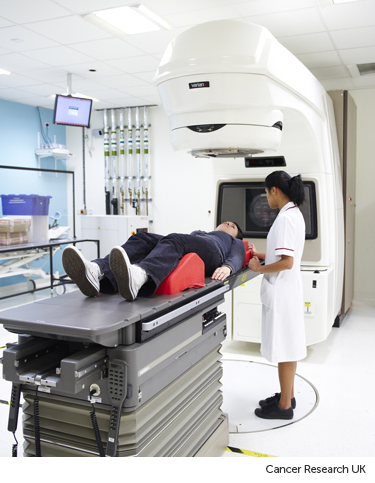Having radiotherapy for metastatic bowel cancer
Radiotherapy uses high energy waves similar to x-rays to kill bowel cancer cells. It can control the cancer, relieve symptoms, and help you feel more comfortable. Radiotherapy to relieve symptoms is also called palliative radiotherapy.
This page is about radiotherapy for metastatic bowel cancer. Metastatic bowel cancer is cancer that started in either the back passage (rectum) or large bowel (colon) and has spread to another part of the body.
When you might have radiotherapy for colon or rectal cancer
You don’t usually have radiotherapy for colon cancer if it hasn’t spread. But you might have it as part of your treatment for rectal cancer that hasn't spread and you have symptoms that are causing you problems.
Planning your radiotherapy treatment
Before you can start radiotherapy, your radiotherapy team needs to plan your treatment. This means working out the dose of radiotherapy you need and exactly where you need it. Your planning appointment takes from 15 minutes to 2 hours.
You usually have a planning CT scan in the radiotherapy department.
The scan shows the cancer and the area around it. You might have other types of scans or x-rays to help your treatment team plan your radiotherapy. The plan they create is just for you.
After your planning session, your radiographers and doctors create your radiotherapy plan. They make sure that the area of the cancer will receive a high dose and nearby areas receive a low dose. This reduces the side effects you might get during and after treatment.
Ask your team how long you should expect to wait before starting treatment.
The radiotherapy room
Radiotherapy machines are very big and could make you feel nervous when you see them for the first time. The machine might be fixed in one position. Or it might rotate around your body to give treatment from different directions. The machine doesn't touch you at any point.
Before your first treatment, your  will explain what you will see and hear. In some departments, the treatment rooms have docks for you to plug in music players. So you can listen to your own music while you have treatment.
will explain what you will see and hear. In some departments, the treatment rooms have docks for you to plug in music players. So you can listen to your own music while you have treatment.

Before your treatment
Your radiographers help you get into position on the treatment couch. You might have a type of firm cushion under your head or knees to help you feel comfortable.
The room is darkened and the radiographers use laser lights to ensure you are positioned correctly.
Then they leave you alone in the room for a few minutes.
During the treatment
You need to lie very still. Your radiographers might take images (x-rays or scans) before your treatment to make sure that you're in the right position. The machine makes whirring and beeping sounds. You won’t feel anything when you have the treatment.
Your radiographers can see and hear you on a CCTV screen in the next room. They can talk to you over an intercom and might ask you to hold your breath or take shallow breaths at times. You can also talk to them through the intercom or raise your hand if you need to stop or if you're uncomfortable.
You won't be radioactive
Radiotherapy doesn't make you radioactive. It's safe to be with other people throughout your course of treatment.
Travelling to radiotherapy appointments
You might have to travel a long way each day for your radiotherapy. This depends on where your nearest cancer centre is. This can make you very tired, especially if you have side effects from the treatment.
You can ask your radiographers for an appointment time to suit you. They will do their best, but some departments might be very busy. Some radiotherapy departments are open from 7 am till 9 pm.
Car parking can be difficult at hospitals. Ask the radiotherapy staff if you are able to get free parking or discounted parking. They may be able to give you tips on free places to park nearby.
Hospital transport may be available if you have no other way to get to the hospital. But it might not always be at convenient times. It is usually for people who struggle to use public transport or have any other illnesses or disabilities. You might need to arrange hospital transport yourself.
Some people are able to claim back a refund for healthcare travel costs. This is based on the type of appointment and whether you claim certain benefits. Ask the radiotherapy staff for more information about this and hospital transport.
Some hospitals have their own drivers and local charities might offer hospital transport. So do ask if any help is available in your area.
Side effects
The side effects vary and will depend on which part of your body is being treated. And the amount of radiotherapy you are having.
The team looking after you will tailor the treatment to your needs. They will make sure any side effects are manageable for you.
Bowel cancer can sometimes spread to the liver. If this happens, your doctor might recommend a specialised type of radiotherapy treatment or another treatment.
Where you have radiotherapy
You have treatment in the hospital radiotherapy department. The length of treatment can vary, you might have:
- one treatment
- treatment every weekday for up to 3 weeks
You will have treatment as an out patient and travel to the hospital each day. Some hospitals have rooms nearby that you can stay in if you have a long way to travel.
You go to the radiotherapy department from your ward if you are staying in hospital.



